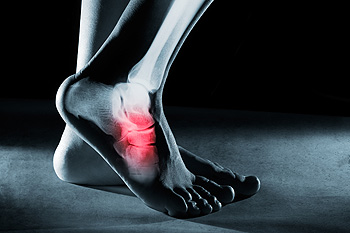Houston
Pearland
 The pain that is associated with cuboid syndrome is generally felt on the outer side of the foot. This condition is known to be common among ballet dancers and athletes, and can develop due to performing repetitive movements. Additionally, it may occur from having had a foot injury, such as stepping off a curb unexpectedly, or twisting your ankle. Symptoms of this condition can include redness surrounding the point of injury, swelling in the ankle, and you may experience difficulty walking or moving the toes. Patients have found mild relief when the affected foot is elevated, as this may be helpful in reducing a portion of the swelling. If you feel you have cuboid syndrome, it is suggested that you consult with a podiatrist who can prescribe you custom orthotics, which may be beneficial in facilitating a speedy recovery.
The pain that is associated with cuboid syndrome is generally felt on the outer side of the foot. This condition is known to be common among ballet dancers and athletes, and can develop due to performing repetitive movements. Additionally, it may occur from having had a foot injury, such as stepping off a curb unexpectedly, or twisting your ankle. Symptoms of this condition can include redness surrounding the point of injury, swelling in the ankle, and you may experience difficulty walking or moving the toes. Patients have found mild relief when the affected foot is elevated, as this may be helpful in reducing a portion of the swelling. If you feel you have cuboid syndrome, it is suggested that you consult with a podiatrist who can prescribe you custom orthotics, which may be beneficial in facilitating a speedy recovery.
Cuboid syndrome, also known as cuboid subluxation, occurs when the joints and ligaments near the cuboid bone in the foot become torn. If you have cuboid syndrome, consult with Dr. Linda D. Nachmani from Central Foot & Ankle Associates. Our doctor will assess your condition and provide you with quality foot and ankle treatment.
Cuboid syndrome is a common cause of lateral foot pain, which is pain on the outside of the foot. The condition may happen suddenly due to an ankle sprain, or it may develop slowly overtime from repetitive tension through the bone and surrounding structures.
Causes
The most common causes of cuboid syndrome include:
Symptoms
A common symptom of cuboid syndrome is pain along the outside of the foot which can be felt in the ankle and toes. This pain may create walking difficulties and may cause those with the condition to walk with a limp.
Diagnosis
Diagnosis of cuboid syndrome is often difficult, and it is often misdiagnosed. X-rays, MRIs and CT scans often fail to properly show the cuboid subluxation. Although there isn’t a specific test used to diagnose cuboid syndrome, your podiatrist will usually check if pain is felt while pressing firmly on the cuboid bone of your foot.
Treatment
Just as the range of causes varies widely, so do treatments. Some more common treatments are ice therapy, rest, exercise, taping, and orthotics.
If you have any questions, please feel free to contact one of our offices located in Houston, and Pearland, TX. We offer the newest diagnostic and treatment technologies for all your foot care needs.
Read more about Cuboid Syndrome